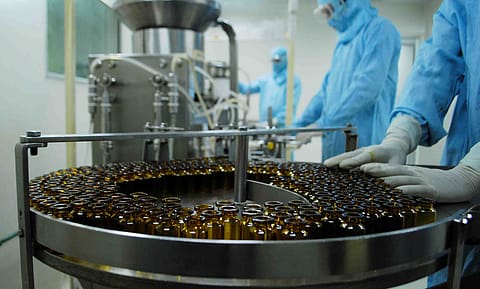Trump tariff on pharma has minimal impact in the short term, but gear up to face future shocks, warn experts
The 100% tariff might not directly impact India’s generic exports, but it sends a clear message that the U.S. desires pharmaceutical manufacturing closer to home

U.S. President Donald Trump’s decision to impose tariffs of up to 100% on imports of branded and patented pharmaceuticals, starting October 1, 2025, is unlikely to have a significant impact on the Indian pharmaceutical industry in the near term. Still, the move triggers a warning signal to remain prepared for future policy shifts and to build risk-mitigation strategies, warn experts.
“Starting October 1, 2025, we will be imposing a 100 per cent tariff on any branded or patented pharmaceutical product, unless a company IS BUILDING their pharmaceutical manufacturing plant in America,” Trump posted on his social media platform Truth Social.
Sources indicate that Trump’s current decision is focussed solely on branded or patented pharmaceutical products. Hence, the impact on Indian drugmakers is minimal, as most products exported from India are generics or reverse-engineered versions of patented medicines.
India is the largest pharmaceutical trade partner for the U.S., supplying nearly 47% of the U.S. public’s pharmaceutical requirements in terms of volume. The U.S. is the largest pharmaceutical market in the world, and India is one of the largest exporters of generic drugs; approximately 35% of India’s pharmaceutical exports were to the U.S. market in FY25.
Indian impact minimum
“The proposed 100% tariff on branded and patented pharmaceutical imports is unlikely to have an immediate impact on Indian exports, as the bulk of our contribution lies in simple generics and most large Indian companies already operate U.S. manufacturing or repackaging units and are exploring further acquisitions,” says Namit Joshi, chairman of Pharmaceutical Export Promotion Council of India (Pharmexcil). However, it is prudent to remain prepared for future policy shifts and to build risk-mitigation strategies, he adds.
Sources say the decision puts Big Pharma, which makes only high-value branded and patented drugs, into a crisis, especially European multinationals. The Global Trade Research Initiative (GTRI) reports that total pharmaceutical imports into the U.S. were worth $212.82 billion in 2024. Of this, Ireland accounted for $50.35 billion (23.66%), Switzerland for $19.03 billion (8.94%), and Germany for $17.24 billion (8.10%).
Major German-headquartered companies include Merck, Bayer, Boehringer Ingelheim, BioNTech, Stada, and Fresenius. Major Swiss-headquartered pharmaceutical companies include Roche, Novartis, and Lonza. Another non-U.S. pharmaceutical MNC, GSK, is based in the U.K.
Recommended Stories
Compared to that, India’s drug trade with the U.S. was worth only $12.73 billion—5.98% of that country's total imports. India has the second-highest U.S. Food and Drug Administration (USFDA)-approved pharmaceutical manufacturing facilities worldwide (499), second only to the U.S. (530). Globally, there are only 2013 USFDA-approved facilities. Outside India and the U.S., the entire Europe has only 460 facilities. China has 340, followed by Canada at 60, Japan at 35, Switzerland at 35, and others at 98, says a recent CareEdge data.
Gear up for future shocks
Looking ahead, India will need to reinforce its cost-efficiency advantage in bulk drugs and active pharmaceutical ingredients (APIs)—an area where the U.S. is likely to favour India over other suppliers—and simultaneously invest in next-generation opportunities such as complex generics, peptides, biosimilars, and CAR-T therapies. “Generics will remain relevant, but will gradually mature; optimising costs and capabilities in these emerging categories will shape the next phase of growth,” says Namit Joshi.
The 100% tariff might not directly impact India’s generic exports, but it sends a clear message that the U.S. desires pharmaceutical manufacturing closer to home, says Hari Kiran Cherddi, managing director, HRV Global Lifesciences. “For Indian pharma players venturing into complex generics, biosimilars, and patented products, this is a serious threat of margin compression as well as market access barriers. It emphasises the need to diversify markets, create resilience in supply chains, and also to adopt active diplomacy to secure India’s pharma leadership,” he says.
Arushi Jain, director of Akums Drugs and Pharmaceuticals, says that despite ongoing uncertainty about future tariff plans for complex medicines (which is now a major focus area for leading Indian drug companies), they are currently not under the purview of the tariffs to be imposed, as the bulk of them are generics.
(INR CR)
